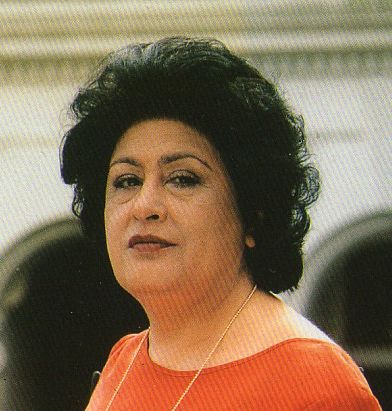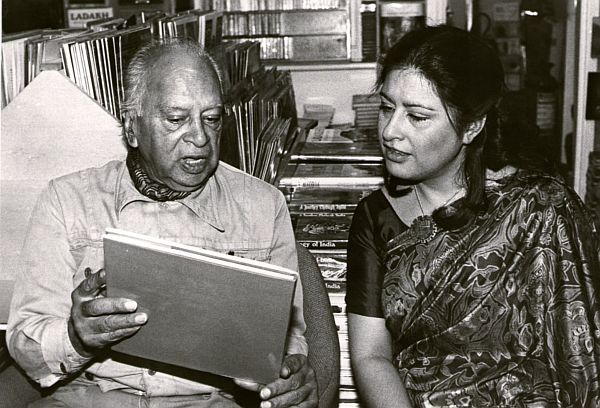Latest Contributions
Read More Contributions
Remembering Mulk Raj Anand
Category:
Tags:

Jamila Massey (nee Chohan) was born in Simla where, before Independence, she went to the famous Auckland House School, established for the daughters of high-ranking British officers. Later, she graduated from King's College, London. She then worked in radio, television, films and in the theatre. She had a role in the well-known BBC radio soap opera The Archers, an Independent TV comedy series Mind Your Language, and the BBC TV soap opera EastEnders.(Her photo shows her as Neelam Kapoor in the EastEnders.) She is now the senior most Asian actress in the United Kingdom. She has collaborated with her writer husband Reginald on three books: The Music of India, The Dances of India, and The Immigrants, a novel.
The novel as a form of literary expression was introduced to India by the British. Among the small group of Indians who first wrote novels in the English language was Mulk Raj Anand (1905-2004), who was born in Peshawar (now in Pakistan).
He was an enterprising Punjabi who managed to find his way to England and earn a doctorate from Cambridge in 1929. In London, he knew many of the Bloomsbury Set (Virginia and Leonard Woolf, Vanessa Bell, John Maynard Keynes, Vita Sackville-West, Lady Ottoline Morrel, Lytton Strachey, et al) and befriended E.M. Forster, T.S. Eliot and George Orwell.
For a time he worked for the Criterion, Eliot's literary publication.
As a journalist in London, he covered the Spanish Civil War.
He knew Picasso and bought a couple of Picasso's paintings. Mulk Sahib was a confirmed Socialist and used the novel as an instrument of social reform. His concern was for the poor of India and especially the 'Untouchables' who had been ground down by centuries of caste prejudice. In Peshawar, an aunt of his ate a meal with a Muslim lady, a good friend of hers. The news spread in the family and the aunt was treated like an achoot, one who had been tainted and was therefore an 'Untouchable'. His aunt committed suicide. This family tragedy stayed with him throughout his long life.
His first novel Untouchable had a foreword by Forster. Among his other important works were The Sword and the Sickle and Coolie. He used the novel just as Shaw used the theatre as an instrument for social change.
He returned to India in 1946.
In India, Mulk Sahib belonged to the Intellectuals of the Left, which included Prithviraj Kapoor (actor and producer), Kishen Chander (poet and writer), Rajinder Singh Bedi (poet and screenwriter), Ali Sardar Jaffri (screenwriter and producer), Kartar Singh Duggal (dramatist), Faiz Ahmed Faiz (poet), and Saadat Hasan Manto (short story writer and screenwriter). In fact, Mulk Sahib was one of the initiators of the All-India Progressive Writers Association.
But he was the only one who wrote in English, and yet retained his strong Indian identity. This is what astounded George Orwell, who was born in India. Mulk Sahib's writing was not only Indian\; but one could hear the very heartbeat of the true Punjabi in his English. An amazing ability.
He founded Marg, India's leading art magazine, and edited it for several years. How he, a Socialist, managed to get one of India's leading industrial houses to fund Marg only goes to show his amazing capability.
My husband knew him better than I did. He knew my husband's prose and poetry, and they got on famously. But I was attracted to his books, his social values and his generosity of spirit. It was he who gave our friend Balraj Khanna valuable contacts in London. Balraj is now a leading painter and novelist in London.
Mulk Sahib was always on the side of the persecuted and the minorities. In September 1996 an International Seminar on The Muse and the Minorities: Social Concerns and Creative Cohesion was convened in New Delhi at the India International Centre. Mulk Sahib was the senior most writer there, and he delivered a historically important speech on the cultural significance of the young Dalit poets who expressed their angst in Marathi. He opened with the following words: "My credentials for contributing to this gathering are from my lifelong devotion to the movements for the uplift of the minorities, the rejected, specially outcastes!"
My husband was also invited to the seminar, and our son Marcus went there as an invited observer. The Proceedings and Papers of the seminar have been published by Mudrit, D-33 Hauz Khas, New Delhi 110016. The ISBN of The Muse and the Minorities is 81-87129-02-6.

Jamila Massey, right, with Mulk Raj Anand in a London bookshop near the British Museum, 1990.
© Jamila Massey 2014
Comments
Add new comment